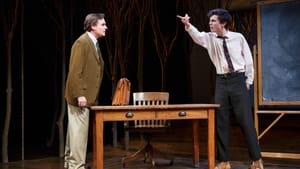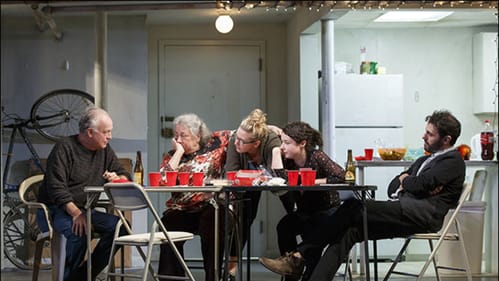Stay in the Loop
BSR publishes on a weekly schedule, with an email newsletter every Wednesday and Thursday morning. There’s no paywall, and subscribing is always free.
Growing up and growing older
'Prodigal Son' and 'The Humans' in New York

Every so often a new play comes along that drills a hole right through your heart. Right now two of them are playing in New York.
At Manhattan Theatre Club, Prodigal Son is a coming-of-age play that uplifts at the same time that it hurts. John Patrick Shanley’s autobiographical story features a Bronx-born boy from a blue-collar family on scholarship at a New England Catholic school. His turbulent three-year tenure there (1965-1968), in what he calls his “special, beautiful room in hell,” calls to mind the prep school play genre, of which Alan Bennett’s History Boys is a notable example.
Jim Quinn (Shanley’s younger self) is, in the words of the headmaster, “the most interesting mess we have this year.” Like Holden Caulfield, he’s an original. He lies, cheats, steals, and beats up younger students. He’s obsessed with T.S. Eliot and the Nazis. He spouts radical beliefs (“Socrates, Jesus, and Thomas More are the same: they’re all suicides.”) He wants to change his name — to Siegfried Sassoon (a poet), Elfego Baca (a Wild West gunman), Rafael Sabatini (a novelist) — anyone’s but his own. “I can’t be myself yet,” he explains to the three faculty members who are trying to help him: headmaster Schmitt (Chris McGarry), his wife Louise (Annika Boras), and a teacher named Hoffman (Robert Sean Leonard). “He’s using poetry as a ladder to climb out of some terrible place,” Louise explains. “You deserve to be saved. You’re one of the desperate ones,” Hoffman tells him.
Rueful retrospection
Neither Shanley (the playwright and director) nor Timothee Chalamet (the superb young actor who plays Jim Quinn) asks us to like this prodigal son, which is precisely what makes us care about him. Quinn is filled with contradictions and yet, thanks to the playwright’s gift of rueful retrospection, Quinn ultimately recognizes the humanity in the three educators who try to save his soul and allow him graduate against all odds.
At the end of the play, Shanley (now 64), speaking through his title character, looks back on his agonizing adolescence and reminds us that, indeed, “the child is father of the man.” He goes a step further: Though we may never fully know ourselves, he implies, it’s the never-ending struggle and quest for self-knowledge that defines us and keeps us alive. The line Quinn keeps quoting from Henley’s “Invictus” — “I am the master of my fate; I am the captain of the soul” — becomes the mantra of the man, for better or for worse.
Enthusiasm and good intentions
The Humans, Stephen Karam’s new family play, is equally gut-wrenching. The Blake family is gathering for a Thanksgiving dinner in the Chinatown basement apartment of Brigid, the younger of two daughters. Brigid and her live-in boyfriend, Richard, have prepared a modest repast on paper plates, served with large helpings of enthusiasm and good intentions. The guests include Brigid’s parents, Erik and Deirdre, (from Scranton); her elderly grandmother, Momo, and her older sister, Aimee.

At first, Karam lulls us with the false promise of a conventional family-gathering play, complete with the requisite eccentrics and banter. But it’s soon revealed that there’s more going on. Richard has just recovered from “a decade of depression” and Brigid is working as a waitress to help pay for their windowless, roach-infested duplex while her hopes for a music career recede. Aimee has just broken up with her partner of many years, is about to lose her job, and is suffering from gastrointestinal problems that will require an operation. Momo is confined to a wheelchair and her dementia is rapidly worsening. Erik, the patriarch, is plagued with financial problems and nightmares. He can’t sleep, while Deidre is struggling in a thankless office job by day and the endless job of taking care of Momo by night.
Generosity and grace
The desperately cheerful attempts at holding it all together for each other gives this play its generosity and grace. But the ghost of 9/11 — which Erik and Brigid witnessed first-hand — haunts them. Ultimately, Erik reveals a traumatic secret that explains his nightmares, and Momo has a terrifying outburst of incoherent rage that disrupts the evening. As the family prepares to disperse, the stage is filled with threatening clangings of the creaky old tenement building — sounds that foreshadow a frightening and unknown future for all.
As Erik, Reed Birney gives a heartbreaking performance of a man who is utterly alone, even in the bosom of a loving family. The ensemble is uniformly excellent, dramatizing with humor and honesty the naked pain of being human, as the play’s title suggests.
With their manageable cast sizes and modest set requirement, these eminently producible, powerful plays will hopefully make their way from Broadway to Broad Street in seasons to come.
What, When, Where
Prodigal Son, written and directed by John Patrick Shanley. Through March 27 at Manhattan Theatre Club’s New York City Center Stage I, 131 West 55th Street, New York. manhattantheatreclub.org
The Humans by Stephen Karam, directed by Joe Mantello. Through July 24 at the Helen Hayes Theatre, 240 West 44th Street, New York. thehumansonbroadway.com
Sign up for our newsletter
All of the week's new articles, all in one place. Sign up for the free weekly BSR newsletters, and don't miss a conversation.
